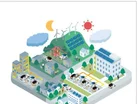Nissan Energy Share EV Charging Technology

Nissan has announced the launch of Nissan Energy Share in Japan, to advance the value of electric vehicles across the country. The service will include Nissan’s energy management technology, which controls EV battery charging - and discharging. It also allows power to be shared from an EV to a building.
Nissan is based in Yokohama, Japan, and was founded in 1933. The company manufactures cars - from SUVs to sports cars, sedans to minivans. Yet Nissan believes that the future of mobility is about more than cars, it is also about creating a global ecosystem that supports sustainable and equitable transportation solutions. Japan’s Nissan Energy Share is another step in this direction.
Key aspects of Nissan Energy Share
After field tests at its sites in Fukushima, Nissan has validated its proprietary technologies for autonomously charging and discharging EV batteries. Out of this, comes Nissan Energy Share, an offer for businesses and even municipal governments, to optimise their energy management, in line with the needs of their customers, which is described as ‘a one-stop service experience from planning and system build-out, to maintenance operations’.
Nissan sees EV batteries as mobile energy units which can fuel vehicles, buildings and communities. This intelligent charging management system can help drivers reach the full potential of EVs, as it obtains real-time information on a vehicle’s remaining charge, as well as energy use in buildings and autonomously determines the optimal timing to charge and discharge.
It offers:
Load shifting through smart charging
Through real-time monitoring of energy usage in buildings and remaining EV battery charge, the system delivers smart control over the optimal timing for charging EVs. In addition, utilising multiple EVs does not affect buildings’ use of electricity.
Peak shaving through discharge management
The system helps shave peak power usage in buildings by supplying power from EVs to buildings when energy demand is high, reducing grid usage and minimising electricity bills.
Efficient use of renewable energy
Buildings with solar panels can be connected to the system, allowing efficient supply and consumption of electricity depending on the power generated. For example, EVs are charged when ample solar power is produced during the day and at night they supply electricity to buildings. This helps businesses move one step closer toward attaining RE100, a global corporate renewable energy initiative bringing together businesses committed to 100% renewable electricity.
Nissan offers customers a one-stop service experience, including:
- Consultation regarding requirements and guidance on solutions
- Equipment recommendations and progress management
- Nissan also offers periodic checkups, troubleshooting and performance analysis based on operation monitoring and improvement suggestions.
Despite this transforming technology, Nissan will continue to engage in efforts to expand the horizons of mobility and build a more connected and sustainable society.
*******************
Make sure you check out the latest edition of EV Magazine and also sign up to our global conference series - Sustainability LIVE 2024.
*******************
EV is a BizClik brand.


